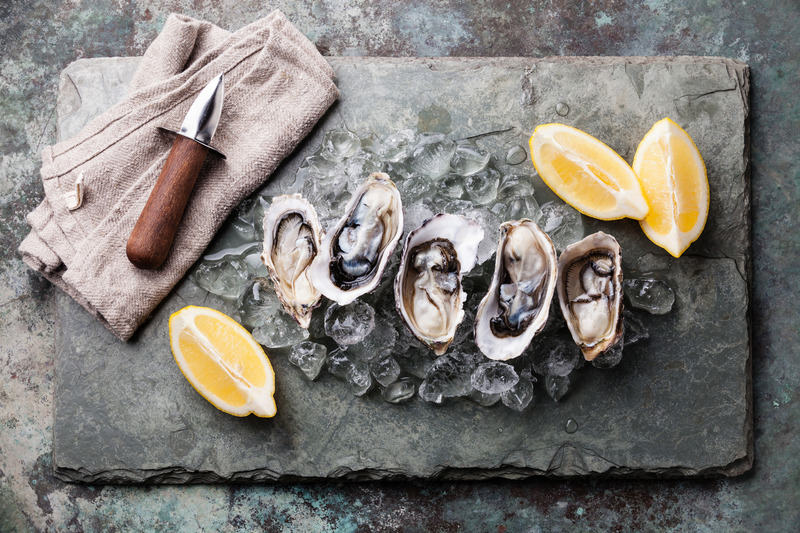Oyster (de-shelled): nutrition facts & data
|
Nutrition facts per 100g |
Oyster (de-shelled) |
avg Crustaceans and molluscs[1]
|
|---|---|---|
| Calories (kcal) | 83.0 | 82.2 |
| Fat (g) | 3.0 | 1.5 |
| Protein (g) | 9.0 | 15.7 |
| Carbohydrates (g) | 5.0 | 1.6 |
| Mono- & Di-Saccharides (g) | 0.0 | 1.6 |
| Polysaccharides (g) | 5.0 | 1.6 |
| Fibers (g) | 0.0 | 0.0 |
| Sodium (mg) | 160.0 | 286.8 |
| Water (g) | 83.0 | 79.4 |
Breakdown in percent (%) of total calories
An average portion size (100g) of Oyster (de-shelled) contains:
- 83.0 Calories
- 3.0g of Fat
- 9.0g of Protein
- and 5.0g of Carbs
- 160.0mg of sodium - 0.1% of the RDA for sodium.
- 30.0mg of Magnesium, that covers 0.1% of the recommended daily allowance (RDA) for Magnesium.
- 22.0mg of Zinc - 2.4% of the RDA for Zinc.
- 3.1mg of Iron - 0.2% of the RDA for Iron.
- 185.0mg of Potassium - 0.1% of the RDA for Potassium.
- 1.0mg of Vitamin C - 0.0% of the RDA for Vitamin C.
- 14.5mg of Vitamin B12 - 4.5% of the RDA for Vitamin B12.
For every gram of carbs in Oyster (de-shelled) you get
- 1.80 grams of protein compared to the average of 0.46g per gram of carbs among all foods. Other foods in Crustaceans and molluscs have on average 9.61g of proteins per 1 gram of carbs.
- 0.60 grams of fat (total average 0.66g, other foods in Crustaceans and molluscs 0.94g)
- 0.00 grams of fibers (total average 0.13g, other foods in Crustaceans and molluscs 0.00g)
Nutrient distribution per gram
What vitamins are in Oyster (de-shelled)?
|
Vitamins per 100g |
Oyster (de-shelled) |
avg[1]
|
|---|---|---|
| Vitamin C (mg) | 1.0 | 1.8 |
| Vitamin E (mg) | 0.9 | 1.3 |
| Vitamin B1 / Thiamine (mg) | 0.2 | 0.1 |
| Vitamin B2 (mg) | 0.2 | 0.1 |
| Vitamin B6 (mg) | 0.2 | 0.3 |
| Vitamin B9 / Folate (μg) | 7.0 | 13.4 |
| Vitamin B12 (μg) | 14.5 | 3.3 |
| Retinol (μg) | 95.0 | 19.8 |
| beta-Carotene (μg) | 0.0 |
Is Oyster (de-shelled) rich in vitamins?
The following chart displays the amount of vitamins per portion Size (100g) for Oyster (de-shelled) of the recommended daily allowance (RDA[1]) for each vitamin in percent.
Learn more about RDA values for vitamins by clicking on the names in the table above.
Minerals in Oyster (de-shelled)
|
Minerals per 100g |
Oyster (de-shelled) |
avg[1]
|
|---|---|---|
| Magnesium (mg) | 30.0 | 41.8 |
| Zinc (mg) | 22.0 | 3.7 |
| Sodium (mg) | 160.0 | 286.8 |
| Calcium (mg) | 80.0 | 69.5 |
| Iron (mg) | 3.1 | 2.6 |
| Potassium (mg) | 185.0 | 260.0 |
| Phosphorus (mg) | 155.0 | 193.6 |
Is Oyster (de-shelled) high in minerals?
Again, for every mineral contained in Oyster (de-shelled) we looked at the portion size (100g) and applied it to the recommended daily allowance (RDA[1]). Data is shown in percent of RDA per portion size.
Learn more about RDA values for minerals by clicking on the names in the table above.
Carbohydrates in Oyster (de-shelled)
5.0% of Oyster (de-shelled) are carbs, per serving of 100g that makes 5.0g of carbs.
Monosachharides and polysaccharides
|
Sugars per 100g |
Oyster (de-shelled) |
avg[1]
|
|---|---|---|
| Monosaccharides (g) | 0.0 | 0.0 |
| Polysaccharides (g) | 5.0 | 1.6 |
| Total carbs (g) | 5.0 | 1.6 |
How high are the Glycemic Index and the Glycemic Load for Oyster (de-shelled)?
The Glycemic Index of Oyster (de-shelled) is 0, which would be considered as low. The Glycemic Load in a normal serving is 0.0 and can be regarded as low.
Allergens in Oyster (de-shelled)
- is Gluten free
- has no Lactose
- no Fructose
Fatty acids and cholesterol in Oyster (de-shelled)
Of the 3.0g total fat per 100g in Oyster (de-shelled), 0.8g are saturated fatty acids (SFA), 1.0g are monounsaturated fatty acids (MUFA) and 0.4g are polyunsaturated fatty acids (PUFA). The amount of cholesterol is 125.0mg.

